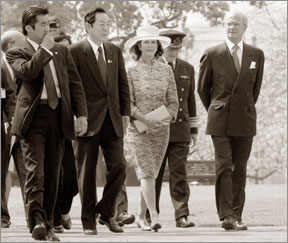Murdered Nagasaki mayor was key nuclear foe
|

Nagasaki Mayor Iccho Ito, second from left, accompanied by a
security officer, guides Swedish King Carl XVI Gustav, right, and
Queen Silvia, center, in Nagasaki Peace Park in this March 30, 2007
photo during the royal couple's trip to the southwestern Japanese
city of Nagasaki at the end of their week-long state visit to Japan.
Ito was shot outside Nagasaki train station Tuesday, April 17,
2007police said. -AP
|
One of the leading voices against nuclear proliferation was silenced
Wednesday when Nagasaki Mayor Itcho Ito died from gunshot wounds. He was
61.Local yakuza Tetsuya Shiroo, 59, was arrested on the spot after Ito
was gunned down on the busy street Tuesday evening in front of JR
Nagasaki Station as the mayor was campaigning for a fourth term.
Shiroo, who reportedly was trying to flee, owned up to the slaying
and a pistol was seized. Police are investigating a possible motive.
Early indications were that the assassination stemmed from a personal
vendetta and not due to the mayor's political beliefs, unlike the 1990
shooting of Ito's predecessor, Hitoshi Motoshima, who survived that
attack by a rightwing extremist angry over his remark that the late
Emperor Hirohito was partially responsible for the war.
It is part of the job of political leaders in Hiroshima and Nagasaki,
the only two cities to have had an atomic bomb dropped on them, to
oppose nuclear weapons. Ito had a particularly high profile as mayor and
was widely respected. "He was well-known for his position, and his loss
is most tragic," said Nishio Baku, codirector at the Citizens' Nuclear
Information Center, an antinuclear organization in Tokyo that compiles
information on nuclear energy.
Rebecca Johnson, founding director of the London-based Acronym
Institute for Disarmament Diplomacy and a long-term acquaintance of Ito,
told Kyodo News, "This kind of violence must not be allowed to silence
the important voices of peace and integrity like Mayor Ito's. "Prime
Minister Shinzo Abe on Wednesday denounced the murder, calling it "a
challenge to democracy."
"A heinous act committed during an election campaign is a challenge
to democracy. We will have to be determined and eradicate this kind of
violence," Abe told reporters Wednesday morning.
Soon after being elected mayor in 1995, Ito told the International
Court of Justice at The Hague that the indiscriminate nature of nuclear
blasts, their inevitable affects on civilians and destruction of the
natural environment, make their use "a manifest infraction of
international law."
The mayor died of blood loss after a four-hour operation to repair
damage to his heart and lungs. He was attached to an artificial
heart-lung machine during that time and never regained consciousness.
His family, including his wife, Toshiko, 61, were at his side. "We
offered the best treatment we could, but were unable to sustain blood
circulation and (the mayor's) heart stopped," the hospital director,
Katsumi Eguchi, told reporters early Wednesday.
The man held in the assassination is the deputy boss of Suishin-kai,
a mob affiliate of Yamaguchi-gumi, the top underworld syndicate. It is
the only direct affiliate based in Nagasaki. On Wednesday, however,
Suishin-kai, which is on a police watch list, said will disband. At 7:52
p.m.
Tuesday, Shiroo allegedly shot the mayor twice in the back from a
distance of about 1 meter after Ito stepped out of vehicle in front of
his campaign office next to JR Nagasaki Station, police and his office
said.
Both bullets entered the mayor's body below his right shoulder blade
and punctured one of his lungs and his heart before stopping at his
breast bone, according to police and the hospital. Members of Ito's
campaign staff jumped on Shiroo and held him down as he tried to flee.
He reportedly admitted right away to shooting the mayor and was arrested
for attempted murder, a charge later updated to murder. His pistol was
also seized.
Police said Shiroo told them he was irritated by the city's handling
of damage done to his car at a construction site that was overseen by
the municipal government.
"I could not stand the response by the city and was infuriated,"
Shiroo was quoted by police as saying. "I did it, wishing to kill the
mayor and thinking I should do it even at the cost of my life."
Other politicians have died during their campaigns, and family
members took their places and won. Prime Minister Masayoshi Ohira, who
was running in the 1980 election for both Diet chambers, and Liberal
Democratic Party member Saburo Toida, who was up for a seat in the 1996
House of Representatives election, both died of heart attacks. Ohira's
son-in-law and Toida's second son took their places and were elected.
The Japan Times |
